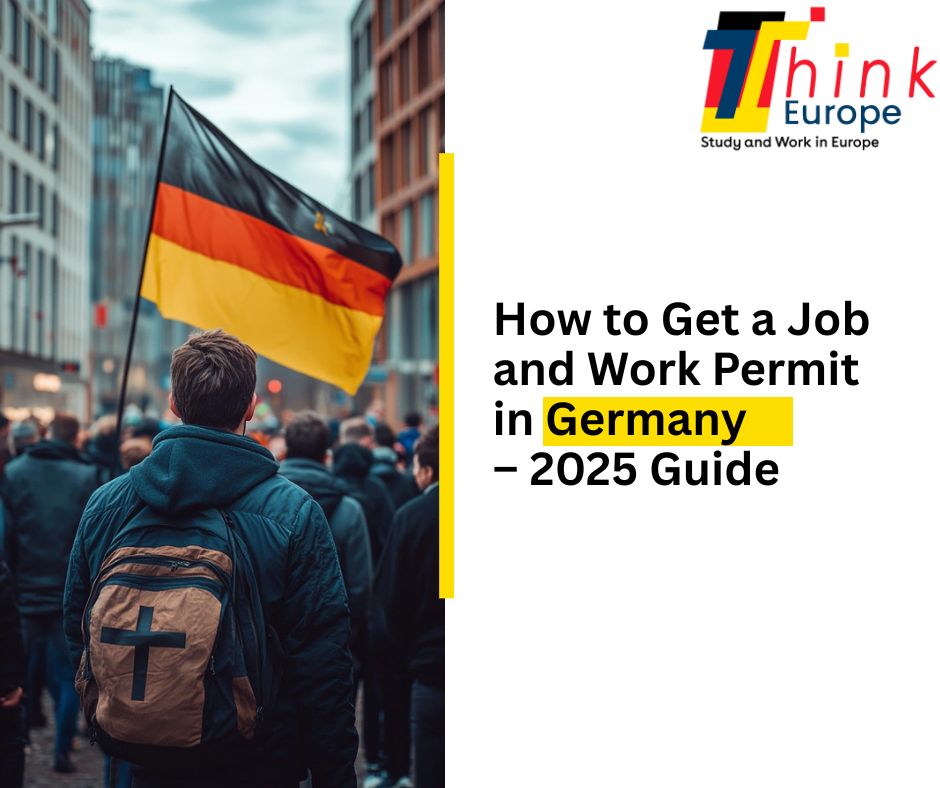How to Get a Job and Work Permit in Germany – 2025 Guide
Germany remains one of the most attractive destinations for skilled professionals worldwide. With a strong economy, high living standards, and a welcoming immigration policy, Germany offers excellent job opportunities for foreigners.
If you're planning to work in Germany in 2025, this guide by Think Europe Services will walk you through the process of securing a job and obtaining a work permit.
Why Work in Germany?
Germany has a thriving job market with high demand for skilled workers, especially in fields like:
- Engineering (Mechanical, Electrical, IT)
- Healthcare (Doctors, Nurses)
- IT & Software Development
- Finance & Business Management
- Trades (Electricians, Welders, Carpenters)
Additionally, Germany offers:
- ✅ Competitive salaries
- ✅ Work-life balance
- ✅ Strong social security benefits
- ✅ Pathway to permanent residency
Step 1: Find a Job in Germany
1. Check Job Portals
Popular job search websites in Germany include:
- Indeed Germany
- LinkedIn Jobs
- StepStone
- Arbeitsagentur (Federal Employment Agency)
2. Apply for Jobs
- Tailor your CV to German standards (include a professional photo).
- Write a compelling cover letter.
- Ensure your qualifications are recognized in Germany (check Anabin for degree recognition).
3. Attend Interviews
- Many companies conduct online interviews first.
- Be prepared for technical and language assessments.
Step 2: Get a Work Visa for Germany
Types of German Work Visas (2025)
- EU Blue Card – For highly skilled professionals with a job offer and a minimum salary (€45,300 in 2025, lower for shortage occupations).
- Skilled Worker Visa – For qualified professionals with recognized vocational training or a university degree.
- IT Specialist Visa – For IT professionals with 3+ years of experience (no degree required).
- Job Seeker Visa – Allows you to stay in Germany for 6 months to find a job.
- Freelance Visa – For self-employed individuals.
Work Visa Requirements
✔ Valid passport
✔ Job offer from a German employer
✔ Recognized qualifications
✔ Health insurance
✔ Proof of financial means (for Job Seeker Visa)
Application Process
- Get a Job Offer
- Apply at the German Embassy in your home country.
- Attend a Visa Interview
- Wait for Approval (typically 4-12 weeks).
- Move to Germany & Register (Anmeldung).
Step 3: Settle in Germany
Once you arrive:
- Register your address (Anmeldung).
- Open a German bank account.
- Get health insurance (public or private).
- Apply for a residence permit at the local Foreigners' Office (Ausländerbehörde).
How Think Europe Services Can Help
Navigating German immigration laws can be complex. At Think Europe Services, we provide:
- Job Search Assistance – Connecting you with German employers.
- Visa & Work Permit Support – Ensuring a smooth application process.
- Relocation Services – Helping with housing, banking, and integration.
Final Thoughts
Germany offers incredible career opportunities for skilled professionals. By following the right steps—securing a job, applying for the correct visa, and completing registration—you can successfully move to Germany in 2025.
Need help? Contact Think Europe Services today for expert guidance on working and settling in Germany!
Call us now or visit our website for a free consultation.
Think Europe Services makes the process seamless—from application to arrival.
Apply Now: https://thinkeurope.de/job/europe-work-visa
Email: info@thinkeurope.de
Begin your German work journey today with confidence and clarity!

